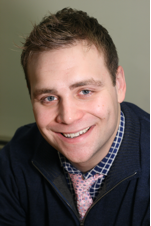People of faith, at our best, are the ultimate independents.
Bible
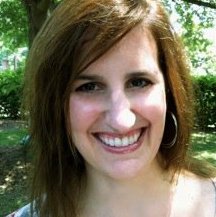
When I applied for a job at CNN in the 90s, and told the interviewer that I had interned with an evangelical magazine called Christianity Today, his response was, "If it's Christian, it isn't journalism."
Over the years that expanded to, "If it's evangelical, it's Republican. Or Jerry Falwell. Pat Robertson. The Tea Party. Wrapped in a Patriotic Flag. White People. Derivative, cheesy music. Big Money. Big Hair." Fill in the rest of the blanks.
Are those labels a distortion of what it means to be an evangelical? Of course they are. Yet they are how evangelicals are perceived, rightly or wrongly (I personally think it's a mixture of both), in our society.
The reason the word Evangelical has become so poisonous is because the answer to the above question comes from a conversion-based model of cultural engagement - political, theological and social. Too many Christians believe, and have wrongly been taught, that those "others" and "opposites" who have made an active choice not to believe in "our" teachings are justifiably: 1) left to their own devices as we wash our hands of them because of their bad choice (think in terms of blood-on-their-own-head); or 2) uninformed, so much so that their "no" is an illegitimate answer.
Evangelicals care more about positions -- whether progressive or conservative -- than people. We lack nuance. We have become either all Scripture or all Justice. I don't know where the balance was lost in terms of holding Scripture in high authority and, simultaneously, loving with reckless abandon?
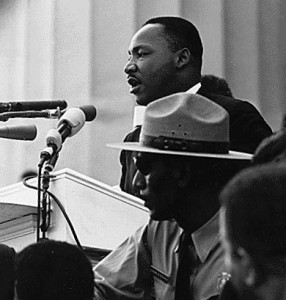 At the dedication ceremony for the Martin Luther King, Jr. Memorial, at least two speakers -- the Rev. Bernice King, Martin Luther King's daughter, and the Rev. Jesse Jackson, one of King's lieutenants -- reminded us that at the end of King's life he was planning the Poor People's March
At the dedication ceremony for the Martin Luther King, Jr. Memorial, at least two speakers -- the Rev. Bernice King, Martin Luther King's daughter, and the Rev. Jesse Jackson, one of King's lieutenants -- reminded us that at the end of King's life he was planning the Poor People's March
The Poor People's March is an ancestor to the current Occupy Wall Street movement that we see breaking out across the globe today. The idea was to bring poor people from across the color line -- white, black, brown, red, yellow -- to Washington to call attention to the importance of economic justice. King understood that economic justice -- distributive justice -- was not a matter of race in the United States.
It was true then, and it is true now that African Americans and Latino/as suffer disproportionately from income inequality. But it is important to remember that people of all colors suffer from the corrosive effects of income inequality. Some of the poorest communities in the country are European American. The poorest states in the United States with some of the worse educational and health care outcomes are states in the former confederacy.
Income inequality has increased since 1968. So the question that insists upon being answer is this: Why has income inequality worsened between 1968 and today?
My friend, Harry Jackson, said that my ideology isn't "Christian" but I suspect what he really means is that it isn't Republican and that's why he disagrees with the things I have said. It's important for Christians to understand those aren't the same thing. I think Bishop Jackson's economic ideology that is indistinguishable from Republican and Tea Party talking points, but I would rather have a civil discussion together as Christians about our differences; rather than his accusing Christians who don't share his conservative economic opinions as coming from "the councils of Hell." C'mon, Harry. I believe the Bible's teachings on wealth and poverty challenge both Republican and Democratic economic views which, sadly, are both often sold out to the interests of the wealthy and large corporations, when they should be focused on the ones Jesus calls "the least of these." Can we discuss that Harry?
Churches play the unique role of seeing the big picture. We can call out the values and virtues of the issues. Let's not just worry about the poor in our own communities, but the poor everywhere, the people everywhere who are struggling. We can't be private anymore. We must be living water for all people.
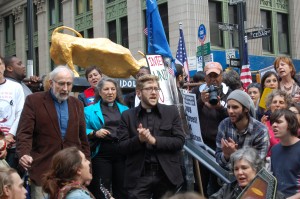 People everywhere are leaving their private spaces and gathering together -- that's already church. This is a Holy Spirit moment.
People everywhere are leaving their private spaces and gathering together -- that's already church. This is a Holy Spirit moment.
The "sermon" consisted of reflections by five participants from different regions and traditions who were attending the Global Christian Forum for the first time. They each spoke of the joy, and often the surprise, in what they discovered here -- some of them interacting with delegates from Christian traditions they barely knew even existed.
The unity of heart and Spirit they experienced at the forum had a profound effect, they said. Emily Obwaka of Kenya, a staff member from the Association of Evangelicals in Africa, whom I met on the bus the first day of the forum, was one of those who shared. She said the forum felt like "a preamble to heaven." Such sentiments might seem excessive but they were not uncommon among the 287 forum participants from 65 countries. Joy and affirmation were among the greatest takeaways from the five-day gathering.
The atlas also documents other dramatic trends, including the fragmentation of Christianity. New denominations, often borne out of strife and division, multiply endlessly. In Korea, for instance, there are now 69 different Presbyterian denominations. At the rate we are going, by 2025 there will be 55,000 separate denominations in the world!
That is an utter mess fueled by rivalry and confusion that hampers the church's witness and makes a mockery of God's call to live as parts of one body.
The atlas also documents the dramatic rise of revival movements throughout the world, and charts the story of Pentecostalism's rise. From its beginning a century ago, Pentecostalism now comprises a quarter of all Christians in the world. This fundamental change in Christianity's global composition, along with its geographical transformation, has created a dramatically different Christian footprint in the world.
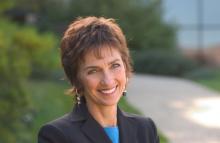
Increasingly, in meetings focused on a wide variety of human tragedies, I hear these words: "What are you doing here? I didn't think evangelicals cared about these things."
I understand those comments. I grew up in a form of Christianity in which "saving souls" was pretty much all that mattered. The God I discovered in that church was a harsh, demanding tyrant; I knew that if I wanted to earn God's love I would have to be very good, follow all the rules, and work very hard. As a devout adolescent I did that. As a young pastor's wife I did that.
Unfortunately, I worked a little too hard and eventually became utterly exhausted, seriously depressed, and physically sick. That plunged me into a total life crisis in which I felt compelled to give up the God of my childhood.
Fortunately, a wise friend said to me, "For a while, forget everything you've ever thought about Christianity; forget the Old Testament; forget Paul and the epistles-and just read Jesus."
So for months -- for years actually -- I just read Jesus. And slowly but surely, Jesus reshaped my understanding of what it meant to be a Christian.
 The puzzle here is not that readers of the Bible would tilt toward the political left. That, for me, as well as for thousands of other American evangelicals, is self-evident. Jesus, after all, summoned his followers to be peacemakers, to turn the other cheek, to welcome the stranger and to care for “the least of these.” He also expressed concern for the tiniest sparrow, a sentiment that should find some resonance in our environmental policies.
The puzzle here is not that readers of the Bible would tilt toward the political left. That, for me, as well as for thousands of other American evangelicals, is self-evident. Jesus, after all, summoned his followers to be peacemakers, to turn the other cheek, to welcome the stranger and to care for “the least of these.” He also expressed concern for the tiniest sparrow, a sentiment that should find some resonance in our environmental policies.
No, the real conundrum lies in the subtitle the editors of Christianity Today assigned to Franzen’s article, which was titled, “A Left-Leaning Text.” Adjacent to a picture of a Bible tilted about 45 degrees to the left, the editors added the subtitle: “Survey Surprise: Frequent Bible reading can turn you liberal (in some ways).”
The fact that anyone should register surprise that the Bible points toward the left should be the biggest surprise of all.

In his column last week, Sojourners chief Jim Wallis talked about his frustration with the perennial misuse of the word "evangelical" by various media to describe folks and ideas that, in his view, and that of many of us who self-describe as evangelicals, don't bear any resemblance to what we understand that term to actually mean.
Below is a compilation of recent media reports where the word "evangelical" is invoked. When you read these, evangelical brothers and sisters, do you recognize yourself in how the word is used and defined? Or does it ring false to you and your understanding of what "evangelical" really and truly means?
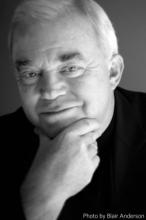
Here we go again. Presidential elections are coming and the role of "the evangelicals" is predictably becoming a hot political story.
Ironically, voices on both the right and the left want to describe most or all evangelicals as zealous members of the ultra-conservative political base.
Why? Perhaps because some conservative Republicans want to claim a religious legitimacy and constituency for their ideological agenda, and some liberal writers seem hell-bent on portraying religious people as intellectually-flawed right-wing crazies with dangerous plans for the country.
Let me try to be clear as someone who is part of a faith community that is, once again, being misrepresented, manipulated, and maligned. Most people believe me to be a progressive political voice in America. And I am an evangelical Christian.
I believe in one God, the centrality and Lordship of God's son Jesus Christ, the power of the Holy Spirit, the authority of the scriptures, the saving death of the crucified Christ and his bodily resurrection -- not as a metaphor but a historical event. Yep, the whole nine yards.
Wall Street has been devastating Main Street for some time. And when the politicians -- most of them bought by Wall Street -- say nothing, it's called "responsible economics." But when somebody, anybody, complains about people suffering and that the political deck in official Washington has been stacked in favor of Wall Street, the accusation of class warfare quickly emerges. "Just who do these people think they are," they ask. The truth is that the people screaming about class warfare this week aren't really concerned about the warfare. They're just concerned that their class -- or the class that has bought and paid for their political careers -- continues to win the war.
So where is God in all of this? Is God into class warfare? No, of course not. God really does love us all, sinners and saints alike, rich and poor, mansion dwellers and ghetto dwellers. But the God of the Bible has a special concern for the poor and is openly suspicious of the rich. And if that is not clear in the Bible nothing is.
Last week, Rollins posted the introduction and first chapter of Insurrection on his website, and I devoured it. He really is one of the most challenging thinkers in the Christian world today.
When I was growing up, there was a house down the street from us which had slightly tattered window coverings and the front lawn was like a graveyard of broken things. Posted on the fence was a "No trespassing" sign. I remember asking my mother what trespassing was so I could be certain not to do it to anyone who lived in that weird house. When she explained that it meant going into their yard uninvited I thought, no problem. Soon after that, when I first learned the Lord's Prayer, I thought it was weird that out of all the sins that Jesus would suggest we ask God to forgive it would be our trespassing. I pretty much made it a policy to stay out of strange yards, and since no one seemed to wander into ours uninvited, I thought I was covered. Only later did I realize that trespassing was only one of countless was to trespass against others. And now I get it -- kind of. Forgive us our sins as we forgive those who sin against us. Jesus always seems to be pairing God's forgiveness of us with our forgiveness of others.
I woke up on the morning of September 11, 2001 both nervous and excited. I had spent the last two months slowly proceeding through the application and interview process for an entry-level editorial position at Christianity Today to work with their Christian History and Christian Reader magazines. I'd had multiple interviews and had to write a few research heavy articles along the way. For someone with degrees in English and History and a graduate degree in Missions, it seemed like the perfect job. My final evaluation involved joining the staff at an all day off-campus retreat, where they would be evaluating potential articles for magazines. I was a bit nervous, but an insider in the company had told me the job was mine, so the excitement of finally landing my first real job after school prevailed.
So on the morning of September 11, I arrived at the country club where the retreat was being held and situated myself at the conference table in a room with a panoramic view of the far west Chicago suburbs.
